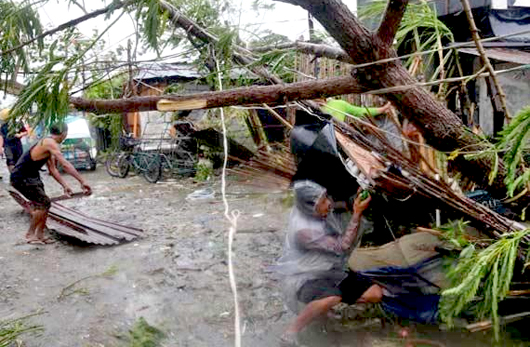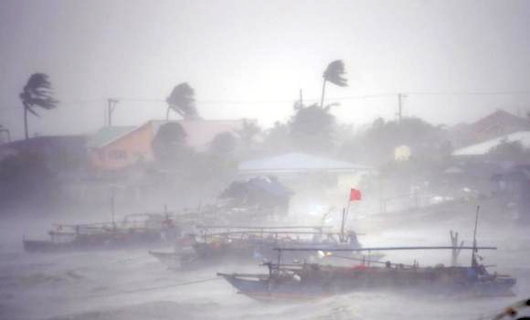
Manila, Jul 17: Millions of people in the Philippines endured a second sweltering day without power today after a ferocious typhoon paralysed the capital and tore down flimsy rural homes, claiming at least 38 lives.
Authorities expressed frustration as reports from badly damaged areas filtered in and the death toll from Typhoon Rammasun, the first major storm of the Southeast Asian archipelago's rainy season, was nearly doubled to 38.
"We still have to find out what exactly are the reasons a lot of our countrymen refuse to heed the warnings," National Disaster Risk Reduction and Management Council chief Alexander Pama told reporters.
As part of a "zero casualty" effort, the government evacuated nearly 400,000 people from the path of Rammasun and warned others to stay indoors.
But many of the people who died were outdoors, killed by falling trees, collapsing buildings and flying debris, according to the council's data.
Pama said the death toll could rise further, with mobile phone and other forms of communication still cut to some rural areas. He said at least eight people remained missing.
Rammasun, a Thai word for "Thunder God", swept in off the Pacific Ocean on Tuesday night, then brought wind gusts of up to 160 kilometres an hour across land to Manila and other heavily populated northern regions.
"It really scrambled whole towns, blowing down houses and toppling power lines," the chairman of the Philippine Red Cross, Richard Gordon, told AFP.
The typhoon cut electricity supplies to nearly all of Manila, a megacity of more than 12 million people, and surrounding urban areas.
Schools and government offices were closed throughout the capital, hundreds of flights suspended and the stock exchange closed.
The stock exchange and government offices re-opened today, but many schools remained closed partly because of the power problems.
The Manila Electric Company (Meralco), the country's largest power distributor which serves the capital and surrounding areas, said 1.9 million households still did not have power yesterday.
With the temperature in Manila expected to hit 30 degrees Celsius and the air thick with tropical moisture, Meralco could not give any estimate to frustrated residents when power would be restored.
Earlier:
Typhoon kills 10, displaces 370,000 in Philippines
Manila, Jul 16: A typhoon killed at least 10 people as it churned across the Philippines and hit the capital, prompting the evacuation of almost more than 370,000 people, shutting financial markets, offices and schools, rescue officials said on Wednesday.
The eye of Typhoon Rammasun, the strongest storm to hit the country this year, passed to the south of Manila on Wednesday after cutting a path across the main island of Luzon, toppling trees and power lines and causing electrocutions and widespread blackouts.
Richard Gordon, chairman of the Philippine Red Cross, said there was minimal damage in the capital but staff were trying to rescue people trapped by fallen debris in Batangas City to the south where two people were electrocuted.
“We have not received reports of major flooding in Metro Manila because the typhoon did not bring rain, but the winds were strong,” he said.
The number of evacuated people had reached more than 370,000, mostly in the eastern province of Albay, the first to be hit by the typhoon, the disaster agency said.
Major roads across Luzon were impassable due to debris, fallen trees and electricity poles.
At least four southeastern provinces on Luzon declared, or were about to declare, a state of calamity, allowing the local governments to tap emergency relief funds.
The storm brought storm surges to Manila Bay and prompted disaster officials to evacuate slum-dwellers on the capital's outskirts.
Some 85 percent of areas serviced by the country's biggest power distributor, Manila Electric Co, in Luzon were without power and were unlikely to be back up within the day, a company spokesman said.
Parts of the Philippines are still recovering from Typhoon Haiyan, one of the biggest cyclones known to have made landfall anywhere. It killed more than 6,100 people last November in the central provinces, many in tsunami-like sea surges, and left millions homeless.
Rhea Catada, who works for Oxfam in Tacloban, which suffered the brunt of Haiyan, said thousands of people in tents and coastal villages had been evacuated to higher ground.
“They are scared because their experiences during Haiyan last year are still fresh,” she said. “Now they are evacuating voluntarily and leaving behind their belongings.”
Social Work Secretary Dinky Soliman said 5,335 families, or nearly 27,000 people, had been “affected” by the storm in Tacloban.
Some had returned to the Astrodome, where thousands sought shelter and dozens drowned during storm surges in the November disaster.
Tropical Storm Risk, which monitors cyclones, labelled Rammasun a category-two storm on a scale of one to five as it headed west into the South China Sea. Super typhoon Haiyan was category five.
A 25-year-old woman was killed when she was hit by a falling electricity pole as Rammasun hit the east coast on Tuesday, the Philippine disaster agency said. A pregnant woman was killed when a house wall collapsed in Lucena City in Quezon province south of the capital.
Trading at the Philippine Stock Exchange and Philippine Dealing System, used for foreign exchange trading, were suspended after government offices were ordered shut.
More than 200 international and domestic flights have been canceled.
A Singapore Airlines Boeing 777 suffered a hole on its left wing when wind gusts pushed the aircraft five meters across the tarmac at Manila airport, hitting equipment parked nearby, airport officials said.






Comments
Add new comment